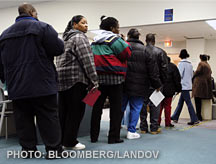Election: Your health insurance at stake
McCain and Obama have vastly different views on the future of employer-sponsored health insurance. Either one could bring big change.
NEW YORK (CNNMoney.com) -- Both presidential candidates want to turn employer-sponsored health insurance on its head. A principal goal: to make sure more Americans get coverage.
But in helping the 45 million uninsured, both Republican nominee John McCain and his Democratic rival Barack Obama could prompt radical changes in on-the-job insurance, which currently covers 164 million people.
"Both McCain's and Obama's plans would move coverage in ways that changes the nature of the employer-sponsored system," said James Klein, head of the American Benefits Council, which represents larger employers.
McCain and Obama take very different paths to what they say is the same endpoint - reforming health care.
As part of McCain's plan, employees would lose the tax exemption for company-sponsored health insurance. Instead, taxpayers would get a refundable tax credit of $2,500 for single filers, or $5,000 for families, to cover the costs of insurance bought on the job or on their own in the individual market.
By doing this, McCain would level the playing field between those who get insurance on the job, where benefits aren't taxed, and those who buy it their own, where it is subject to tax. The tax credit would let more of the uninsured afford coverage.
Obama, on the other hand, is promising to push employers to cover more Americans as part of his health care proposal. He would require larger companies provide insurance to employees or contribute toward the cost of a national plan, while giving small businesses a tax credit to entice them to offer coverage to their workers.
The plans of both candidates raise the concerns of employers and experts, who say the proposals could wind up undermining the nation's employer-based health insurance system.
Most workers still depend on their employers for health benefits, but the system is already under stress. Only 62.9% of Americans under age 65 had employer-based coverage in 2007, down from 68.3% in 2000, according to the Economic Policy Institute. This means more than three million fewer people had on-the-job coverage in 2007 than seven years earlier.
Under McCain's plan, employees would get taxed on the value of their health insurance, which on average costs $12,680 per year for a family, according to the Kaiser Family Foundation. Workers pay an average of $3,354 in premiums, while their employers cover the rest.
Most employees have their premiums deducted from their paychecks without paying tax on them. So, if you make $50,000, you are likely paying tax on only $46,646 of income.
Under McCain, your taxable income would rise to $59,326. If you were in the 25% tax bracket, it would mean an additional $3,170 in taxes.
But this increase would be knocked back by the $5,000 tax credit. So in the end, you'd actually have $1,830 to put in a health savings account, which could be used to cover premiums and other medical expenses.
Experts, however, fear that eliminating the tax advantage of employer-based coverage would prompt younger, healthier workers to leave their office plans. If that happened, costs for the remaining workers could skyrocket. Companies may drop coverage altogether.
"If companies know their employees have the tax credit, it relieves them of the burden of providing coverage," said Sara Collins, who directs a health insurance program at the Commonwealth Fund. McCain's plan "moves people out of the employer system and to the individual market."
Some 74% of companies said that eliminating the tax exclusion would have a "strong negative impact on their workforce," according to a September survey by the American Benefits Council.
Estimates vary, but the Tax Policy Center estimates that 20 million people would lose their employer-based coverage by 2018. Roughly the same number would gain insurance through other means. But, overall, McCain's plan would do little to reduce the number of uninsured.
Also of concern, experts say, is the fact that the $5,000 tax credit would be indexed to inflation. As a result, it would not keep up with the swiftly rising cost of health care, which was soaring as much as 13% a year in the middle of this decade.
McCain advisers counter these concerns. Changing the tax treatment wouldn't hurt the employer-sponsored system and would allow more of the uninsured to buy their own coverage, they say. Also, his advisers say a McCain administration would keep an eye on the credit to make sure it didn't lag behind the cost of coverage, while also working to lower the rate of medical inflation.
Younger, healthier workers likely wouldn't abandon their company-sponsored plans, said Douglas Holtz-Eakin, McCain's senior economic policy adviser.
"Why would they leave?" said Holtz-Eakin. "What they are getting from their employer is way better than what they could get with the credit."
Obama's approach is very different. The Democrat would require larger companies to provide "meaningful coverage" for their staffs under a "pay or play" system. If they don't provide insurance, they would have to subsidize the cost of a national plan.
Small businesses, which would be exempt from this provision, would receive a new refundable tax credit of up to 50% of the premiums paid on behalf of their employees. They could also join a new National Health Insurance Exchange, which Obama envisions would provide public and private plans to individuals and small employers.
This could entice smaller employers to provide coverage, said Jennifer Tolbert, principal policy analyst at the Kaiser Family Foundation.
Currently, only 49% of small businesses provide health care coverage, down from 57% in 2000, according to the Commonwealth Fund.
Workers who already have health insurance at their jobs won't see much of a change, though Obama says he could lower their annual medical costs by as much as $2,500 a year by improving technology, increasing competition and stressing prevention and better management of chronic diseases.
Obama's policy advisers say they want to expand the employer-based system since they believe it works well.
"We need to build on success, not tear them down and try to build new plans," said David Cutler, senior health care adviser to Obama.
The Tax Policy Center estimates that an additional five million people would gain coverage by requiring employers to extend coverage, but it finds Obama's plan lacking details on nearly everything else.
"The numbers aren't supported by anything," said Robertson Williams, principal research associate at the Tax Policy Center.
Among the big questions many have is how Obama decides which small businesses would be eligible for the credit and how larger employers would have to pay into the national system. Also unclear is exactly how he'd save workers as much as $2,500 a year.
Businesses fear the mandates under Obama's plan would tax their resources at a time when many are struggling because of the economic downturn. Some 46% of companies said requiring employers to "pay or play" would have a "strong negative effect on their workforce," according to the American Benefits Council.
Companies are also wondering how Obama will define "meaningful coverage" and whether their plans are acceptable, experts said.
"It could limit employers' flexibility in the type of plan they provide because it may not meet the standards," said the council's Klein. ![]()






